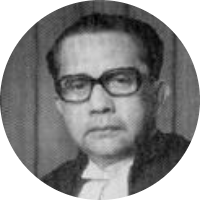Sabyasachi Mukharji

Sabyasachi Mukharji
Former Chief Justice of India
Assumed Office18th Dec, 1989
Retired On25th Sep, 1990
Previously
Judge of the Supreme CourtMarch 15th 1983 - December 18th 1989
Acting Chief Justice of the Calcutta High CourtMarch 1st 1983 - March 14th 1983
Judge of the Calcutta High CourtJuly 1968
Advocate1949
Profile
Sabyasachi Mukharji enrolled as an advocate of the Calcutta High Court on November 23rd 1949. As an advocate, he specialised in Civil, Revenue and Constitutional matters and served as Standing Counsel for the Income Tax Department. He also served as a member of the Study Team on Administrative Tribunals as a part of the Administrative Reforms Commission in 1964-65.
S. Mukharji CJI was appointed as a permanent judge of Calcutta High Court on July 31st 1968. During his tenure, he also served as a member of the Eighth Finance Commission in 1982. On March 1st 1983, he was appointed as Acting Chief Justice of the Calcutta High Court.
He was elevated to the Supreme Court on March 15th 1983. Six years later, he was appointed as Chief Justice of India on December 18th 1989. He succeeded Venkataramaiah CJI to become the 20th Chief Justice of the Supreme Court. He passed away nine months into his term as CJI on September 25th 1990.
During his six-year tenure at the Supreme Court, Mukharji CJI wrote 315 judgments and was a member of 597 benches.
He primarily authored judgments related to tenancy, arbitration and direct taxation matters.
Notable Judgements
In A.R. Antulay v R.S. Nayak (1988), the then Chief Minister of Maharashtra, A.R. Antulay, faced allegations of corruption. Eventually, he had to resign but remained an MLA. At this point, he was prosecuted for corruption. The legal issue in the case was whether MLAs were public servants who could be criminally prosecuted for corruption.
In 1984, this issue reached a five-judge bench of the Supreme Court. The Bench held that MLAs were not public servants. However, while doing so, it also transferred the various legal disputes related to the corruption allegations to the Bombay High Court, instead of a Special Trial Court. Antulay challenged this decision as an unfair trial. He pointed out that if the High Court conducted his trial, he could appeal only once to the Supreme Court. But if the trial was at a Special Court, he could appeal twice: first to the High Court and then to the Supreme Court.
A seven-judge Bench headed by Mukharji J ruled that the five-judge Bench in 1984 had curtailed Antulay’s right to use an appellate remedy by transferring the case to the Bombay HC. In his majority opinion, he ruled that the Supreme Court cannot confer jurisdiction on a High Court that was not constitutionally or statutorily conferred.
In P.N. Dua v P. Shiv Shankar (1988), P. Shiv Shankar, Minister for Law, Justice and Company Affairs, delivered a speech where he said that anti-social elements and criminals have ‘found their heaven’ in the Supreme Court and benefited from the Court's decisions. He was charged under the Contempt of Courts Act, 1971.
Mukharji J’s opinion circumscribed the scope of contempt of court. For these comments to amount to contempt they had to affect the ‘administration of justice'. He noted that if anti-social elements and criminals were benefiting from the Court’s decision this was due to statutory defects. Hence, these comments viewed from this ‘proper perspective do not affect the administration of justice and there was no reason to initiate contempt proceedings.
In Charan Lal Sahu v Union of India (1989), the five-judge Bench led by Mukharji J upheld the validity of the Bhopal Gas Leak (Processing of Claims) Act, 1985. The Act gave the Government exclusive rights to represent the victims in Court. It was argued that since the Government had permitted the establishment of factories without necessary safeguards, they could not claim to represent victims affected by an accident in these factories.
The Bench upheld the statute and allowed the Government to have the exclusive right to represent the victims. They concluded that the Government supported the victims who otherwise were unable to represent themselves.
